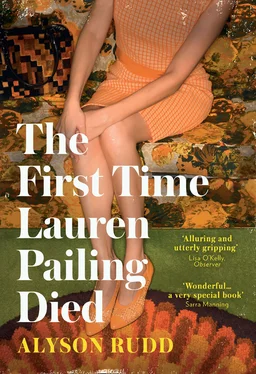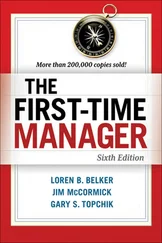It hurt to move but her right arm was unharmed, not even bruised, so Lauren gingerly lifted her hand to her mouth and licked her forefinger.
‘Lean closer, Mum,’ she said and gently rubbed at her mother’s forehead. This time it was Vera’s turn to flinch. She had never liked her mole to be touched.
Lauren frowned. The small but annoying mark on her mother’s face was not flat but raised and rubbery and solid and not at all like a smudge of eyebrow pencil or an errant piece of melted chocolate. She squinted at Vera suspiciously and then at her own right hand. There was silence, while Vera realised that the spot her daughter was trying to rub away had always been there.
‘What a funny thing to forget about, darling,’ Vera said, again with forced brightness.
‘I didn’t forget,’ Lauren said angrily but she was bereft more than angry and she wondered why she felt as if her mother were dead when there she sat, on the bed, breathing and talking and being so obviously loving.
Through her recuperation her parents, and her mother in particular, had been attentive and doting but Lauren had become frustrated by Bob and Vera’s lack of a sense of fun. Before her holiday to Cornwall, Lauren had hated Benny Hill, but loved how her father had giggled like a schoolboy in front of the television. Mr Hill had now vanished from their lives, and so had the giggles.
‘Have they stopped making…’ Lauren started to ask, but discovered she suddenly could not remember the comedian’s name. She closed her eyes and tried to picture his face but she could not even do that. The harder she tried the more distant he became and within the hour she had forgotten that such a man had ever existed.
Lauren had fractured her skull, broken ribs, snapped her arm and splintered her right kneecap. It had been sore, then boring, then sore again. It was Bonfire Night before Lauren felt able to walk outside. The Harpers in the grand house were holding what the invitation they had pushed through the letterbox called their ‘annual firework party’. They had never held one before, but Lauren allowed this detail to pass without letting it annoy her. The Harpers had spent a lot of money on the display and the cul-de-sac residents cooed accordingly. Lauren, though, was more intrigued and impressed by the Harpers’ stained-glass window which seemed both familiar and not. It was decadently large, and depicted a white dove against an expensive azure-blue sky.
Her father worked slightly longer hours than she recalled him working before the accident, and her mother did not go to work in the boutique on Saturdays. Lauren wondered why she thought she would work there, so little interest did Vera seem to have in clothes. Her mother was altogether just a little bit less outgoing since the accident in Cornwall. It must have knocked her confidence, Lauren thought. Her skirts were slightly longer, her jumpers less jazzy, but she was just as tender and loving and smelled the same. Yes, she smelled exactly the same.
Gradually, Lauren forgot that she must have shifted to somewhere else. So many things felt off-kilter but they were small things and the doctors all said she might have lapses in memory. She did not push the point, she did not tell them that there were no gaps in her past; that her past felt skewed. She did not want these tiny electric shocks of surprise; she wanted to feel she belonged, and so she willed it that her other mummy was simply her only mummy, Dad was Dad, and Debbie was Debbie.
Lauren clung to sameness. It brought her disproportionate joy when she found a small black lacquer box at the back of her wardrobe and knew what she would find inside. She had had a six-month spell of collecting buttons in primary school, and she smiled at how tacky they looked compared to how magical she had thought them four years earlier.
If only the same were true of the garage, which was lined with long splinter-free wooden shelves, upon which were stacked neat wooden boxes bearing brightly coloured labels indicating items such as ‘torches and matches’ or ‘anti-freeze’. She stood, watching Bob proudly fishing out a nail from a box of nails that were all the same size, and wondered why she pitied him. She brought him a mug of tea one cold Saturday morning and he was grateful and he smiled and told her how lucky he was not to have a stroppy and thoughtless daughter, but then there was a silence and she walked away feeling less warm inside than she had expected to.
Debbie’s mother Karen was changed in other ways – ways that everyone, not just Lauren, could see. It was the guilt she felt over the accident in the Jeep. For weeks she was unable to be in the same room as Lauren without bursting into tears, and Vera, who had originally been tempted to freeze her out of their lives, was melted by her neighbour’s remorse and they became closer friends than they had been before.
The next summer, the curtains were tightly drawn against the sun so that Bob and Vera and Lauren could watch the tennis from Wimbledon, cheering on John McEnroe and rooting for the bespectacled but pretty Jocelyn Evert, and through a tiny gap popped a concentrated shaft of sunlight fizzing with dust. Lauren felt a bolt of indigestion. It was like the unannounced visit of a long-forgotten friend.
It took the crack in the curtain to make Lauren remember that she used to see a different sort of sunbeam, magical thick ropes of metal that were both fascinating and cruel. She sighed at the shock of the sunbeam and let it go. She could not even remember if the beams had exhausted her, entranced her or worried her. In the weeks that followed, she had dreams about the few occasions on which multiple beams had appeared, blocking her path as if angry with her, but the dreams ebbed into different dreams about vapour trails and knitting and a sports day tug-of-war. She stopped noticing the mole on her mother’s forehead and started noticing the boy playing the lead in the sixth-form production of West Side Story .
Before long, Lauren was able to walk, limping still, past No. 2 without giving any thought to who lived there. The fact that it was a house bereft of any twin boys stopped registering with her. She had accepted, and then forgotten, that the twins had not moved away. They had never lived there. The twins, in this world, had not been born and, perhaps because they had never existed, Lauren was able to absorb their absence as easily as anyone can accept that they left their keys to the left or the right of the table lamp. There was no significance. They were not even a memory, they were the wisp of smoke from the corner of a distant dream.
Mr and Mrs Cork, who did live at No. 2, were on the quiet side, but after an initial moment of uncertainty Lauren accepted that she had known them all her life. They smiled at their neighbours and wrote thank-you notelets to everyone who gave them a gift to mark the arrival of Jonathan, their first child, whose birth had been either ‘difficult’ or ‘botched’ depending on who you spoke to. Jonny would grow to become the mascot of The Willows, the child welcomed into every home because everyone felt a little bit sorry for him but also a little bit amused by his sunny stupidity. And not a day passed that Mr Cork did not wonder what sort of son would have been his first-born child had a different midwife been on duty that night.
Lauren liked to listen to her parents chatting to each other. She yearned to be older, to be free to do anything at any time of her choosing, to be able to talk about politics and money and know what it meant. She noticed that although her father left the house at twenty-past eight every day and arrived back home just after six thirty in the evening, it was the details of her mother’s day which filled the conversations. She wondered if her father was involved in very secretive work or perhaps had a role that was too complicated for casual conversation. Or perhaps his work was so very dull that Vera’s trip to the hairdresser’s was a more enriching topic of conversation.
Читать дальше












